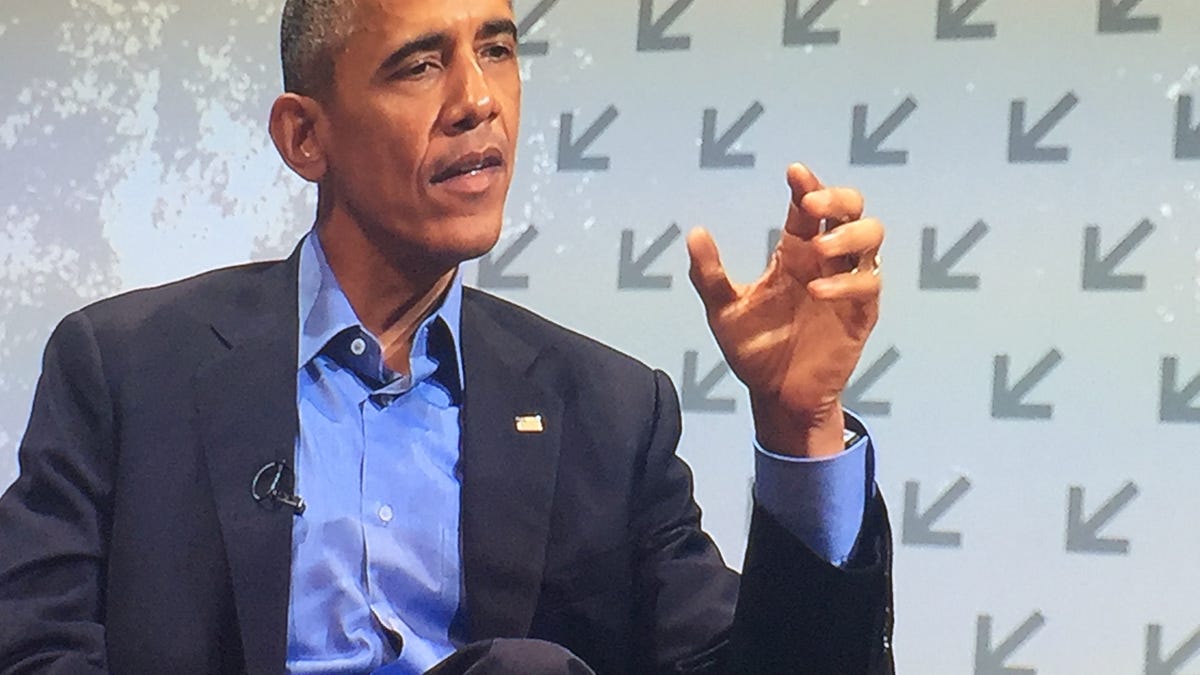Obama: We can't take an 'absolutist' view on encryption
Though the president says he's not talking specifically about Apple's scuffle with the FBI, he thinks data should be treated like all other privacy trade-offs we make for public safety.

President Barack Obama spoke at the South by Southwest conference in Austin, Texas.
When President Barack Obama was asked Friday about the federal government's high-profile battle with Apple over iPhone data, his answer was simple: "I can't comment on this specific case."
But then things got not-so-simple. Though he said he wasn't talking specifically about Apple, he spoke more generally about security, privacy and encryption.
He said Americans have always made privacy trade-offs with the government when it comes to public safety -- for example, when it comes to cases of child pornography, or even the annoyance of waiting in a long security line at the airport.
"This notion that somehow our data is different, and can be walled off from those other trade-offs we make, I believe is incorrect," said Obama, speaking in front of about 2,000 people in Austin, Texas, during South by Southwest, the first time a sitting president has ever spoken at the 30-year-old tech, music and film festival.
"You cannot take an absolutist view on this," he said. "The dangers are real."
To recap: Apple is in the middle of a standoff with the FBI over the government's request for data from an iPhone used by a terrorist in the December shootings in San Bernardino, California, which claimed the lives of 14 people. Silicon Valley has thrown its support behind Apple, with tech giants including Google, Facebook and Microsoft filing friend-of-the-court briefs. At stake is what the tech industry believes is its duty to safeguard the privacy of its users, while law enforcement officials say they need access to data as a matter of national security and crime-fighting.
Obama conceded there should not be an overreach by the government. "Technology is evolving so rapidly that new questions are being asked," he said. "I am of the view that there are very real reasons that we want to make sure the government can't willy-nilly get into everyone's iPhones."
Still, he said, the issue isn't black and white. "If technologically it is possible to make an impenetrable device," Obama asked, "how do we apprehend the child pornographer, or disrupt a terrorist plot?"
The shiny new thing is not enough
Obama talked about more than just privacy and data.
The worlds of Silicon Valley and Washington, DC, have grown increasingly connected, as technology has become an influential driver of the economy and tech companies have pushed the bounds of regulation and policy. Obama, the first president of the social-media era, is no stranger to the tech industry. He's met with key leaders of Silicon Valley several times, including the brass at Apple, Google and Facebook.
"There's a strong attention to the startup ecosystem in the White House," Hugh Forrest, head of SXSW Interactive, the tech-specific portion of the festival, said in an interview earlier this week. "Disruption is going head-to-head with regulation."
Earlier this week, the White House announced an expansion of the TechHire initiative, which is aimed at making sure more Americans are trained to fill technology jobs. The effort, launched a year ago this week, is a partnership between the White House and 50 communities around the country, including Austin, Seattle and Miami. The program uses methods like coding boot camps to try to ensure technology skills are taught to different types of people across the board, including people who have been unemployed for a long time and people changing careers.
That's key because the White House says more than half a million of today's jobs are in technology.
Getting schools and communities to teach technology skills earlier also affects another problem plaguing the tech industry: diversity. Whenever tech executives are confronted about not having a diverse enough work force, one of the most common responses is that there aren't enough women and minorities with those kinds of skills in the pipeline.
The Department of Homeland Security also said that starting May 10, international students who earn a degree in a science, technology, engineering or mathematical (STEM) field will be able to stay longer in the US after they graduate. The new rules will let them stay for three years after graduation to get more work experience. That's a bump from the one year previously allowed for international students, regardless of their major.
The administration also pledged more support for the so-called "maker" movement, a growing do-it-yourself ethos where people build things using technologies including 3D printing and computer-assisted design. The White House urged schools to create more "makerspaces" for students, with the hope that they could be a kind of 21st century shop class.
On Friday, Obama also said that it's up to the tech industry to try to engage people on how they can become more involved in civics.
"It's not enough to just focus on, what's the cool next thing?" he said. "But how do we use and harness the cool next thing?"

